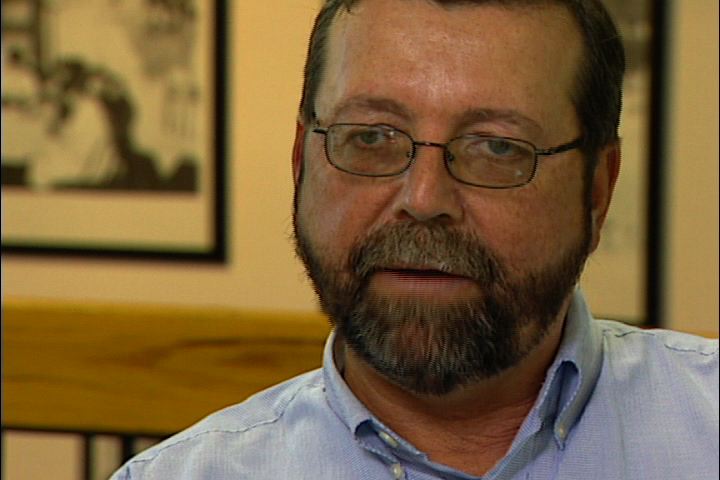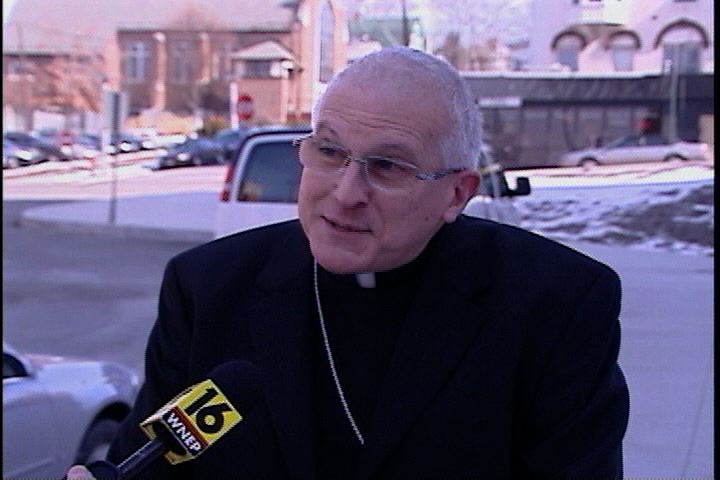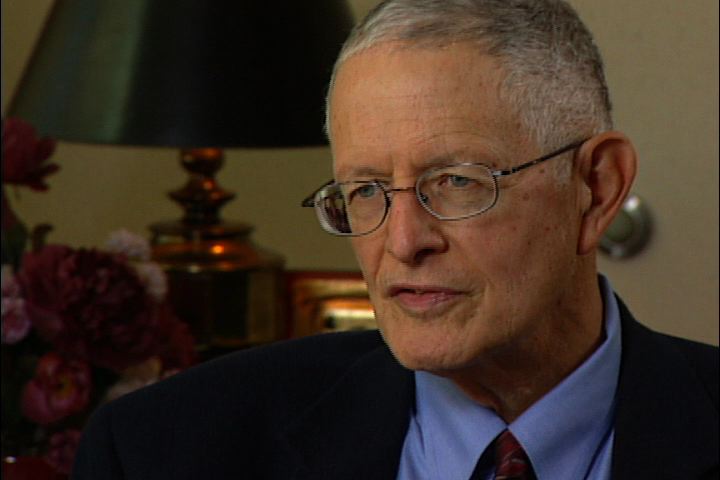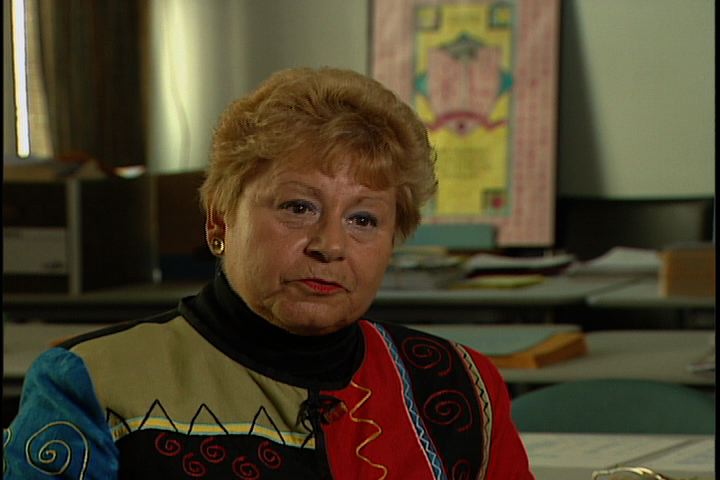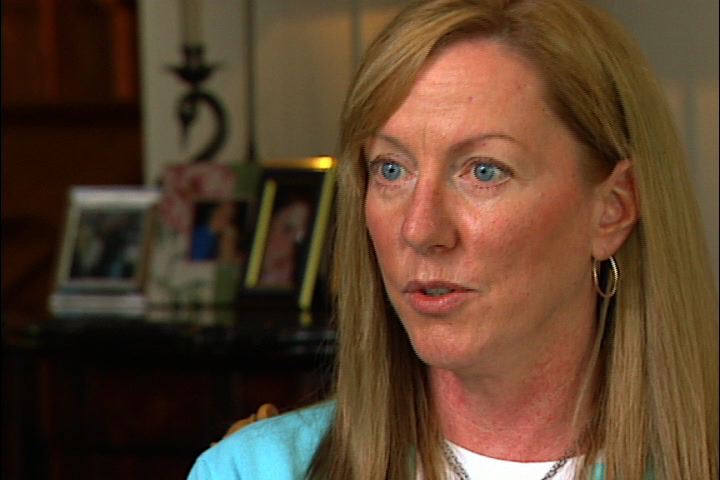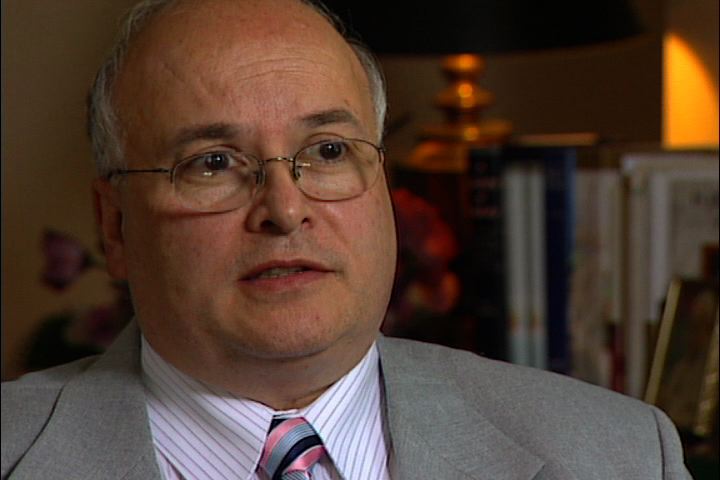In This Episode << SLIDE LEFT TO SEE ADDITIONAL SEGMENTS
Catholic Church and Labor
LUCKY SEVERSON: There was a time when a labor strike like this one against the Catholic Church in Scranton, Pennsylvania, would have been difficult to imagine. The Church, after all, has always been the champion of workers rights. These workers are Catholic school teachers whose union was suddenly shut out of the Scranton Diocese.
MICHAEL MILZ (President, Scranton Diocese Association of Catholic Teachers): It’s union busting of the worst sort because we’re used to union busting in the 21st century. But we’re not used to those kind of tactics coming from the Catholic Church. How can you not say it’s hypocrisy when you say that when they urge other employers to allow their workers to have the right to organize, yet deny it to your own workers?
SEVERSON: The Scranton Diocese had recognized the union, which represents about a third of its teachers, for over 30 years until Bishop Joseph Martino arrived. He commissioned a study of the dwindling parochial school enrollment. The bishop then consolidated four unionized high schools into one and said it would no longer work with the union. It caused an uproar in Scranton’s heavily unionized Catholic community.
Bishop JOSEPH F. MARTINO (Diocese of Scranton): Many people do not understand all of the facts, and I think if they saw the kind of rhetoric that I’ve endured from various sides they would see that we are beyond the stage of talking at this point. So I have made a decision and I don’t think the word has gone out yet. But it is final
SEVERSON: The Bishop’s stance might not have caused such an outcry if not for the Church’s long record on workers’ rights. Over a hundred years ago, Pope Leo XIII issued an encyclical supporting workers’ rights to a living wage and union protection. In the 1960s, the Church defended the farm workers’ right to organize. And as late as 1986, U.S. Catholic bishops proclaimed that “no one may deny the right to organize without attacking human dignity itself.”
RITA SCHWARTZ (President, National Association of Catholic School Teachers): It’s one thing to champion a farm worker or a textile worker. It seems to change radically when it’s your own employees that are trying to unionize.
SEVERSON: In fact, since the 1970s, Church leaders have attempted, sometimes successfully, to bust Catholic teachers unions across the country. Brian Benestad teaches theology at the University of Scranton, a Jesuit school. He says there are times when fighting the union is justified.
Professor BRIAN BENESTAD (Theology Department, University of Scranton): The right to form a union is really not an absolute right, and I think a bishop, when he would look at a teacher’s union, he would have to see if that union would at all get in the way of the aim of the school — you know, for example, if the existence of the union would be some kind of obstacle to maintaining the Catholic identity, you know, or the academic excellence or even the financial viability of the school.
SEVERSON: The union says money was not a big issue — that parochial teachers understand they will earn considerably less than public school teachers.
Ms. SCHWARTZ: I told Catholic teachers many times if they taught for the money, if they were here for the money I hope their medical plan was good, because they needed to have their heads examined.
SEVERSON: Joseph Casciano is superintendent of Scranton’s Catholic schools. He says money is always an issue, and coming up with more would require increasing tuition, something many parents can’t afford. He is concerned that because there is so little money available for salaries, the union would instead demand, for example, that teachers not be required to attend functions like Mass with the students, and that, he says, would sidetrack them from their jobs as ministers of the Gospel.
JOSEPH CASCIANO (Superintendent of Schools, Diocese of Scranton): We only want what we’ve always wanted and that is that you accept your responsibility as one of the ministers in our Church, and we believe we do whatever it takes to fulfill that mission.
Ms. SCHWARTZ: To keep people who have a legitimate right to have a say over the conditions of their employment — to keep them from doing that and using as an excuse that they are ministerial, that’s to me hiding behind religion.
SEVERSON: To replace the teachers union, the bishop created one of his own, representing not only teachers but all diocesan employees.
Prof. BENESTAD: These are associations of the administrators, and the teachers and the staff people and the aids, and they meet on a regular basis to discuss, you know, everything pertaining to working conditions, benefits and wages.
Mr. MILZ: They created a company union, which is illegal in every other workplace in America. The only legitimate representation that employees can have is when they decide the method of representation that they want to have with their employer.
SEVERSON: Milz was a high school history teacher for 33 years before he was let go, along with other teachers, when the diocese consolidated schools. He was told that other teachers had more seniority.
Mr. MILZ: I was fired for my union activity. There were a lot of teachers who had more seniority than me. But there were also a number of teachers who had lesser seniority that I did.
SHARON HOURIGAN: Kevin thought Mike Milz was probably the best teacher he ever had.
SEVERSON: Sharon Hourigan’s son Kevin and her daughter Megan were attending Catholic schools at the time. She says she was shocked when she heard what the diocese had done because she knew the sacrifices teachers were making, even when there was a union.
Ms. HOURIGAN: I saw the teachers that were, you know, sitting in broken chairs and, you know, falling out of them half the time, and they would spend their money on supplies for the classroom. They would take their free time to tutor the kids, and it was just incredibly appalling to me that after all of this time, after 30 years of this kind of service, that they would be treated so shabbily — just appalling.
SEVERSON: Denying the union was not a risky venture because the diocese knew the law, as it is now, is on its side. In 1979, the U.S. Supreme Court ruled that Catholic teachers were not protected by the National Labor Relations Act because they weren’t included in it. But when the act was written, the vast majority of Catholic teachers were nuns and priests. Now it’s different. Today nine out of 10 teachers are lay teachers.
In a last ditch effort to get union protection under state law, the Pennsylvania House is debating legislation, known as House Bill 2626, which is similar to laws already enacted in three states. It would force the diocese to bargain collectively with teachers’ unions in religious schools of all faiths and allow them to bring grievances to the Pennsylvania Labor Relations Board — a bill the diocese strongly opposes.
Prof. BENESTAD: If the Catholic schools are required to recognize the union, then you’re going to have government, you know, intervening in the school, making decisions about whether the bishops’ invocation of doctrine is really genuine.
SEVERSON: John Dean is a lawyer and serves on the board of Holy Redeemer High School. He argues that the proposed legislation violates the separation of church and state.
JOHN DEAN (Board Member, Holy Redeemer High School, Diocese of Scranton, speaking at school board hearing): House Bill 2626 would constitute a governmental intrusion into our interest in the continuing stability and religious identity of our children’s educational path and an unconstitutional impingement on our rights to religious freedom.
What concerns me as a parent of Catholic students is that our teachers currently accompany our students to Mass. It is certain, certain that the teachers’ union will attempt to negotiate that as a term and condition of employment. I do not want the school system . . .
AUDIENCE shouts in protest.
Mr. DEAN: I do not want . . .
Mr. MILZ: That is a lie. That is a lie. Wherever you got that information, you were misinformed or lied to.
SEVERSON: The legislation will be reintroduced in both Houses when the legislative session begins in January. While the union holds out hope, Sharon Hourigan seems to have lost hers.
(to Ms. Hourigan): Has this affected your faith?
Ms. HOURIGAN: Huge, hugely, yeah. It’s very hard for me to say this, and it’s scary for me to say this, especially publicly, but I’ve lost my faith. I really have, and I have to say that given all of what has gone on in our little town, in our diocese, I admire anyone that can hang onto it.
Mr. CASCIANO: What do we have to compromise, and where do we have to compromise? It affects the mission of the Church. One of the concerns that was at the forefront was always the mission of the schools — that it would truly be that our schools would truly be Catholic and that they would do what they are supposed to do, which is an extension of the Church itself.
SEVERSON: For now that mission will proceed as dictated by Bishop Martino. An appeal from the union to the Vatican was recently denied, and the bishop’s right to go forward without a union was upheld.
For RELIGION & ETHICS NEWSWEEKLY, I’m Lucky Severson in Scranton, Pennsylvania.

